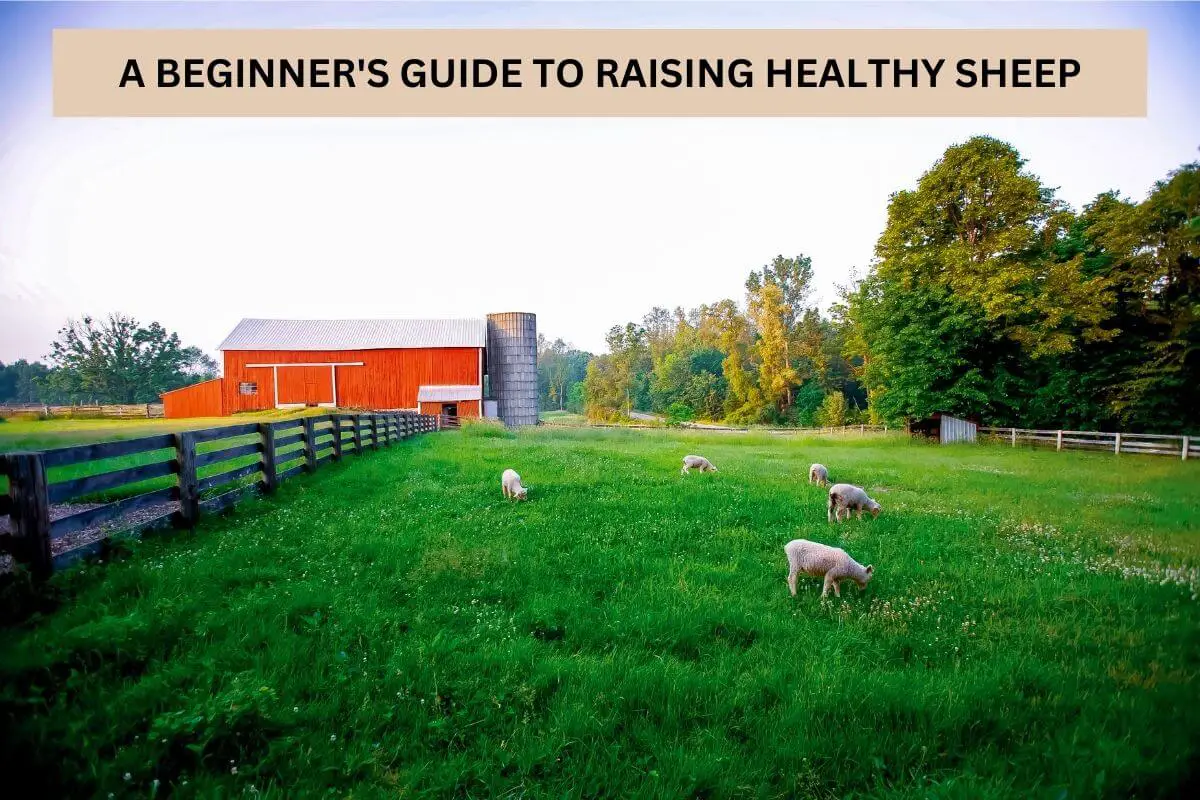Raising sheep is a rewarding and fulfilling experience for beginners looking to dive into animal husbandry.
My beginner’s guide explores the essential aspects of raising sheep for beginners and provides helpful tips and advice to get started.
So let’s dive in!
Determining If Raising Sheep Is Right For You
Whether it’s for wool, meat, or simply as pets, there are many reasons why people choose to raise sheep. However, sheep require proper care and attention like any other livestock to ensure their health and well-being.
As a beginner, you should understand the basics of sheep care, from choosing the right breed to providing proper nutrition and shelter.
1. Assessing your interests and skills
Consider what you hope to gain from raising sheep, whether it’s for wool, meat, or pets. You should also evaluate your skillset, including knowledge of animal husbandry, pasture management, and basic carpentry for building shelters.
Additionally, assess the amount of time and resources you can commit to raising sheep, as it requires regular care and attention.
2. Evaluating the costs and potential profits
You will have to evaluate the cost of purchasing sheep, equipment, and infrastructure. You must also factor in ongoing expenses such as feed, veterinary care, and fencing.
Potential profits depend on why you’ve decided to keep sheep and the market demand for products such as wool, meat, or breeding stock. Careful planning and financial analysis determine the feasibility of raising sheep as a profitable venture.
3. Considering the time commitment
Raising sheep requires a significant time commitment, especially during lambing season. Daily tasks such as feeding, watering, and checking for health issues take several hours.
Preparing for winter and managing pasture requires ongoing attention. Having a realistic understanding of the time commitment needed will ensure the success of your flock.
4. Examining the land and resources available
When considering sheep farming, thoroughly examine the land and resources you have available.
Sheep require sufficient grazing areas and access to clean water. Fencing and shelter are also necessary to protect them from predators and inclement weather.
The land area should be appropriate for the number of sheep and allow for the rotation of pastures to prevent overgrazing.
Evaluating these factors helps determine if the available resources are suitable for raising sheep.
Topics To Learn About First
In this section, we will explore some of the essential topics to learn about first when thinking about beginning to raise sheep.
1. Basic animal husbandry
Basic animal husbandry is a critical skill for anyone thinking about raising sheep. It includes understanding sheep anatomy and behavior, as well as recognizing signs of illness or distress.
Regular tasks such as hoof trimming, shearing, and administering vaccinations or medications are also part of animal husbandry.
A basic understanding of animal husbandry is essential for ensuring the health and well-being of your flock.
2. Sheep behavior and communication
Understanding sheep behavior and communication is important for effective flock management. Sheep are social animals and use various vocalizations and body language to communicate with each other.
By observing their behavior, you can identify signs of stress or illness and prevent potential issues. Understanding sheep behavior also helps with breeding, lambing, and flock integration.
3. Wool and meat production
Wool and meat production are two of the primary reasons people raise sheep. Understanding the basics of wool production includes shearing, sorting, and processing the fleece. For meat production, breed selection, nutrition, and proper handling and processing are critical factors.
You must understand the goals and priorities of your flock clearly and choose a breed that aligns with those objectives.
4. Marketing and sales
Sales and marketing are essential considerations for those planning to raise sheep for profit. Knowing your target market and understanding consumer demand for products such as wool, meat, or breeding stock is critical.
You should be prepared to research and become familiar with developing a brand identity, creating a website, and using social media to promote your products and reach potential customers.
Additionally, attending local fairs and markets, building relationships with retailers, and networking with other farmers expand your customer base.
Sheep Raising Books To Read
Start by ordering a number of the top sheep raising books on the market:
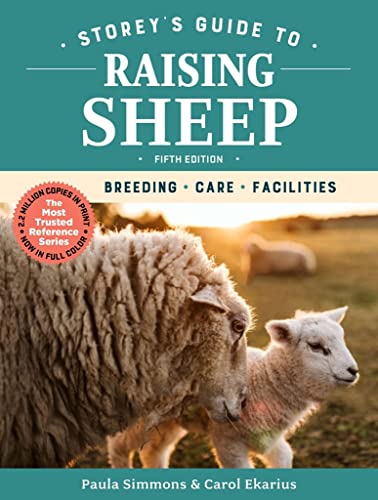

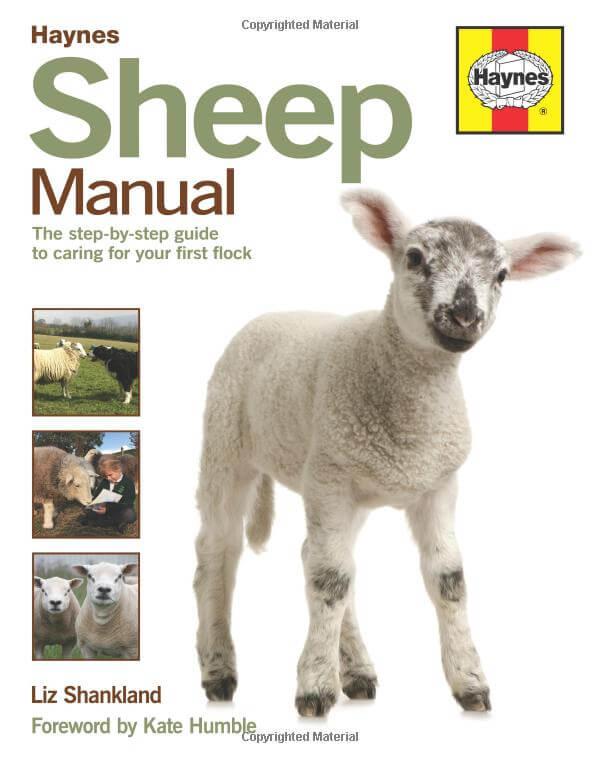
Local/Regional Organizations and Resources
This section will explore some of the top local and regional organizations and resources for people looking to start raising sheep in the U.S.
1. Farm and agriculture associations
Local farm and agriculture associations are valuable resources and support for sheep farmers. These organizations often offer educational programs, networking opportunities, and access to industry experts.
Some examples include the National Sheep Improvement Program and the American Sheep Industry Association.
2. Livestock breeders and dealers
Livestock breeders and dealers are excellent resources for those interested in raising sheep. They offer guidance on breed selection, provide quality breeding stock, and offer advice on flock management.
Choosing a reputable breeder or dealer and conducting thorough research before making any purchases will pay dividends in the long run.
3. Veterinarians and animal health services
Having a trusted veterinarian and access to reliable animal health services is crucial for potential smaller-scale sheep farmers. A veterinarian provides guidance on flock health management, disease prevention, and treatment options.
Additionally, local animal health services and clinics offer routine vaccinations, testing, and other services to maintain the health of your flock.
4. Agricultural extension services
Agricultural extension services can help by offering educational resources, training programs, and on-site visits to provide guidance and support for new and experienced farmers.
Extension services also provide information on local regulations, funding opportunities, and other important resources to ensure the success of your sheep farming enterprise.
Local/State Laws
Local and state laws significantly impact those looking to start raising sheep in the U.S.
These laws vary widely by location and may affect everything from zoning regulations to animal welfare requirements.
1. Zoning regulations
Zoning regulations influence where and how you raise sheep. Some areas may restrict the number of animals you keep on your property or may not allow certain agricultural activities in residential areas.
Research local zoning regulations before starting your sheep farming enterprise to ensure you comply with the law.
2. Animal welfare and protection laws
These laws are in place to ensure that animals are treated humanely and with respect.
You must understand and comply with these laws to maintain the health and well-being of your flock and avoid potential legal issues.
3. Licensing and permit requirements
Licensing and permit requirements vary by state and locality and may be necessary for those looking to start raising sheep. These requirements include permits for building structures, animal handling, and waste management.
You will need to research the necessary licenses and permits before starting your sheep farming enterprise to avoid potential legal issues.
4. Environmental regulations
Environmental regulations affect how you manage your sheep farming enterprise. These regulations may include requirements for waste management, water usage, and land use.
Understanding and complying with these regulations will help you protect the environment and avoid potential legal issues.
Preparing a Habitat
Preparing a habitat is an essential step when starting a sheep farming enterprise. Providing a suitable habitat improves your sheep’s health and well-being and affects your business’s success.
This section will examine some key considerations when preparing a habitat for your flock.
1. Assessing the land for suitability
Before starting a sheep farming enterprise, you must assess your land to determine its suitability for raising sheep.
Factors to consider include:
- the size and topography of the land
- soil type
- availability of water sources
Understanding these factors allows you to make informed decisions when preparing a habitat for your flock.
2. Building and maintaining fences
Building and maintaining fences is an important aspect of sheep farming as it helps to contain your flock and protect them from predators. They should be sturdy and properly maintained to ensure the safety of your sheep.
You should also consider the size and spacing of fence posts and wires and the type of fencing material used to prevent your sheep from escaping or becoming entangled.
3. Providing shelter and water
Providing protection and water is crucial for the health and well-being of your sheep. Shelters protect them from extreme weather conditions, while access to clean water ensures proper hydration and helps regulate body temperature.
Provide adequate shelter and water sources that are easily accessible and regularly maintained.
4. Developing a grazing plan
Developing a grazing plan is an essential part of sheep farming as it helps to ensure adequate nutrition for your flock while also managing the impact of grazing on your land.
Considerations for developing a grazing plan include:
- the flock size and nutritional requirements
- the size and quality of your pasture
- the timing and duration of grazing periods
A well-planned grazing system improves pasture quality, produces healthy sheep, and increases overall productivity.
Choosing the right breed
Choosing the right breed for your sheep farming operation depends on several factors, including your farming goals, the climate and terrain of your land, and the market demand for specific breeds.
Some breeds are better suited for meat production, while others excel in wool production or as companion animals.
Researching and selecting a breed that fits your specific needs and resources is key to a successful sheep farming enterprise.
1. Determining your production goals
Determining your production goals is crucial for successful sheep farming. Goals depend on the intended use of the sheep, such as wool production, meat production, or breeding stock.
The size of the flock, the amount of land available, and the resources you have to invest in the operation should also be considered when determining your production goals.
Understanding your goals will guide your management decisions and ensure your operation is profitable and sustainable.
2. Evaluating breed characteristics
When evaluating breed characteristics, consider traits such as growth rate, wool quality, and adaptability to your local climate. Different breeds have different needs and excel in certain areas, so choosing a breed that aligns with your production goals and resources is essential.
Additionally, researching breed associations and talking with experienced sheep farmers provides valuable insights into breed characteristics and management strategies.
3. Assessing breed availability and cost
Assessing breed availability and the cost is an important consideration when looking to raise sheep domestically. Depending on your location, some breeds may be harder to find than others.
Additionally, different breeds may come with extra costs, including initial purchase price and ongoing expenses for feed, veterinary care, and shearing.
*The price of a single sheep varies widely depending on many factors, but expect to pay between $40 and $500 USD.
| USD 🇺🇸 | EUR 💶 | British Pounds 🇬🇧 | AUD 🇦🇺 | |
| Rams | $150 to $500 | €145 to €490 | £120 to £410 | $210 to $700 |
| Ewes | $200 to $300 | €195 to €295 | £165 to £250 | $280 to $420 |
| Lambs | $40 to $200 | €39 to €195 | £33 to £165 | $55 to $280 |
4. Selecting reputable breeders
When selecting a breeder for your sheep, conduct thorough research and choose a reputable breeder with a history of healthy and high-quality animals. You can start by asking for recommendations from other sheep farmers, attending livestock shows, or searching for breeders online.
Be sure to ask about the breeder’s breeding program, animal health practices, and any guarantees or warranties they offer.
Click the images below to learn more:



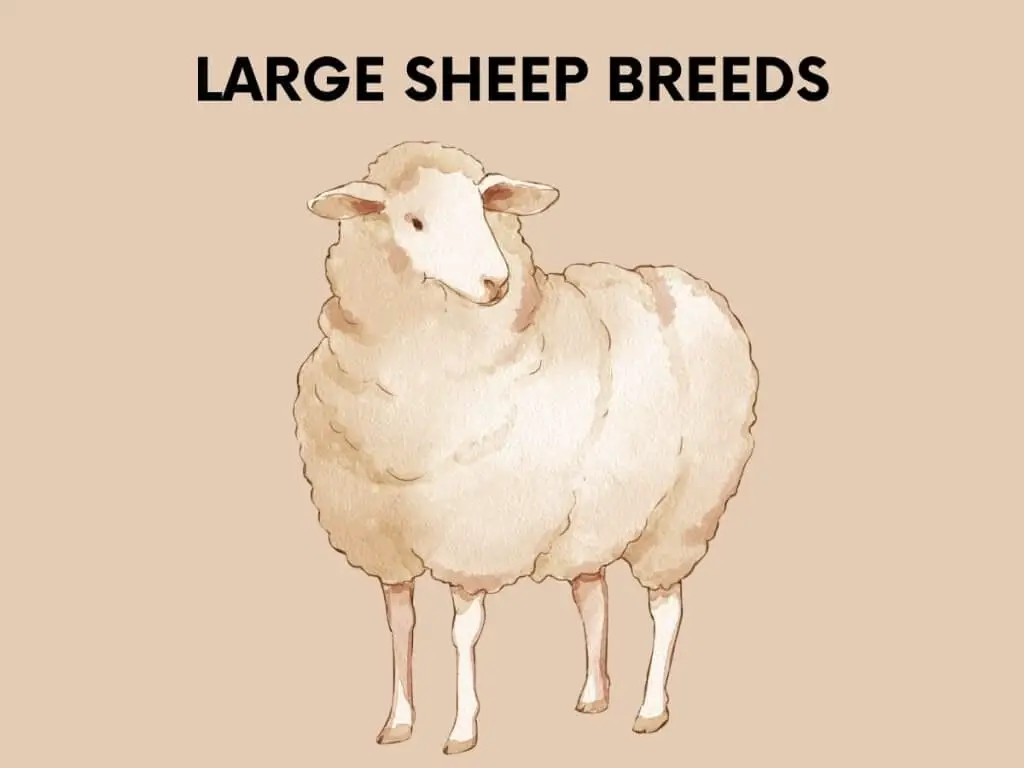
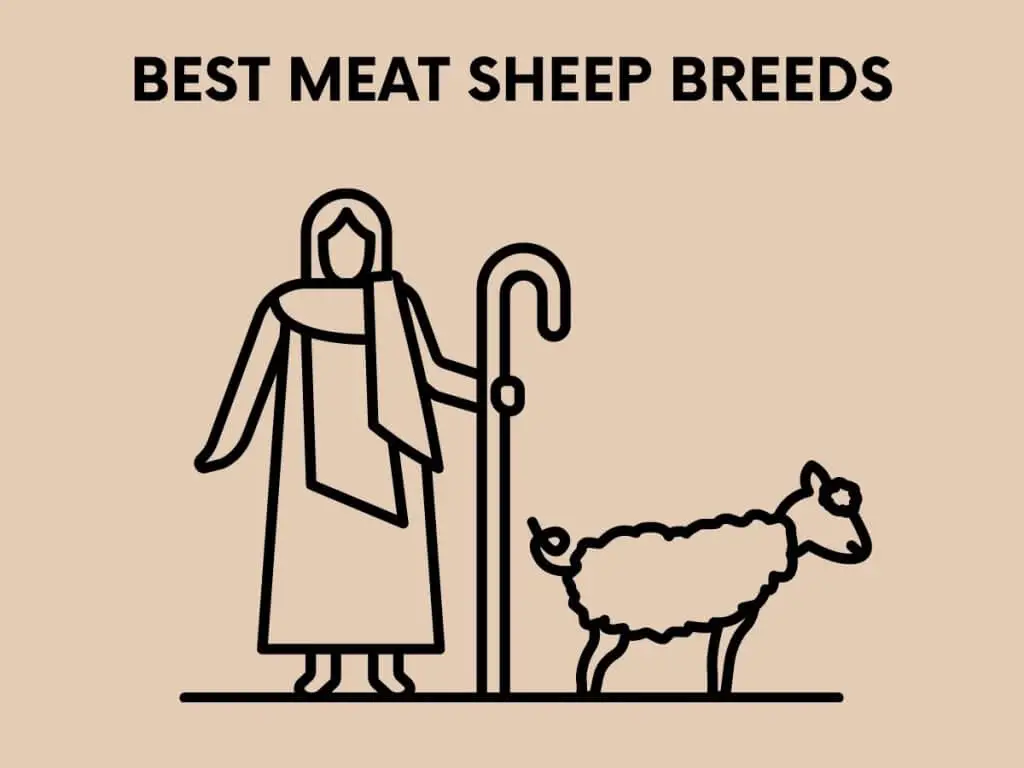
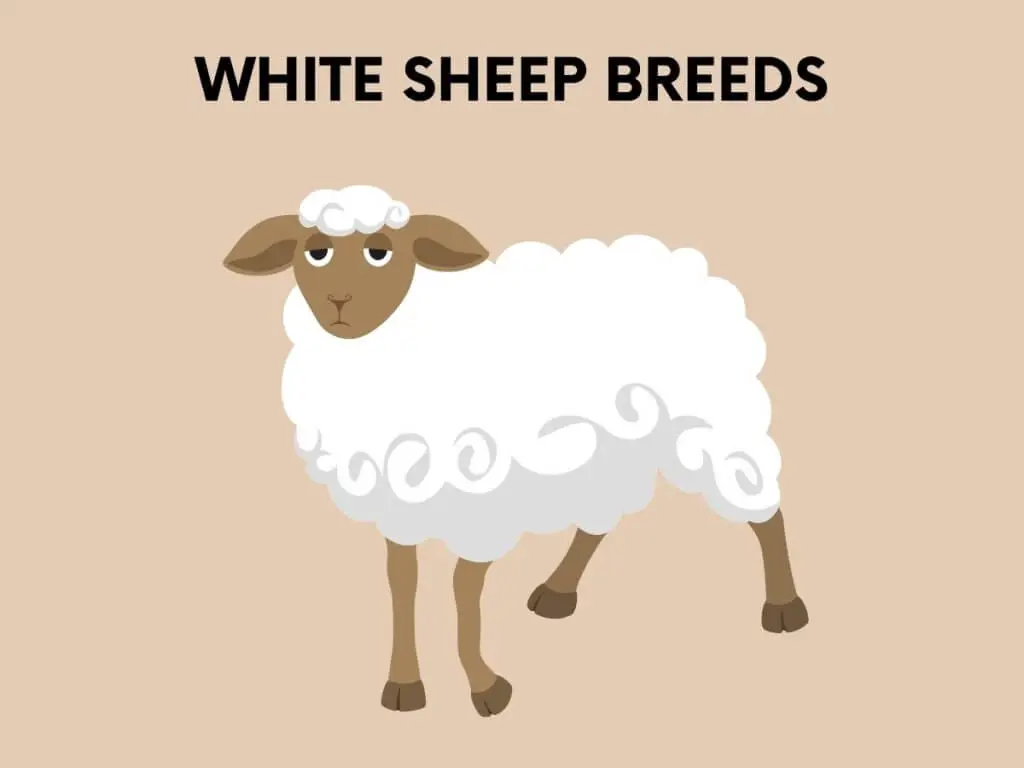
Sourcing And Buying
Working with reputable breeders or sellers is crucial when sourcing and buying sheep. Ask for recommendations from other sheep farmers or local agricultural organizations.
You should also carefully inspect the animals for overall health and condition before purchasing. Transport and quarantine procedures should also be considered to prevent the spread of disease to your flock.
1. Identifying reputable suppliers
When looking for reputable suppliers for raising sheep domestically, research the topic thoroughly and ask for recommendations from other farmers or livestock owners.
You can also attend livestock auctions and shows to meet breeders and view their animals. Choosing suppliers who prioritize animal health and have a good reputation in the industry is also the best way to go.
2. Evaluating animal health and history
You should consult a veterinarian to perform a pre-purchase examination to ensure the animal is healthy and free of any diseases or illnesses.
You must also obtain information about the animal’s vaccination history and any medications it may have received.
3. Negotiating prices and terms
When negotiating prices and terms for purchasing sheep, you must clearly understand the current market prices and factors that influence them. Establishing a good rapport with the seller and asking for references or testimonials from previous customers should also be a feature of how you do business.
Lastly, have a written agreement that outlines the terms and conditions of the sale, including warranties, return policies, and payment arrangements.
Click the images below to learn more:

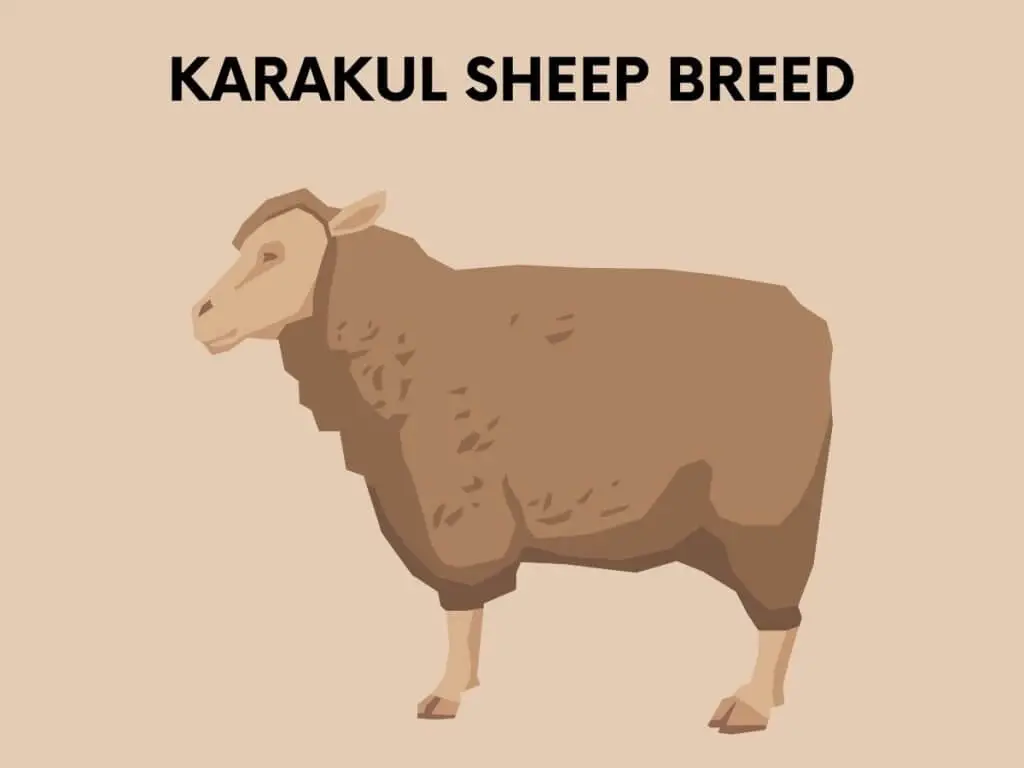
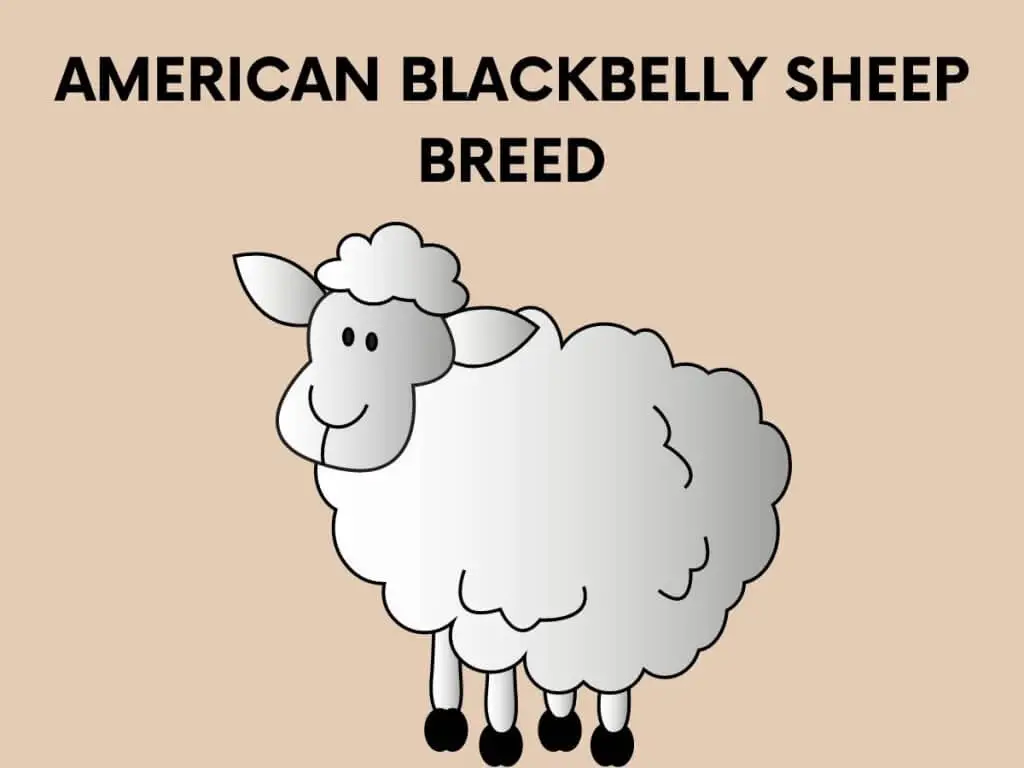
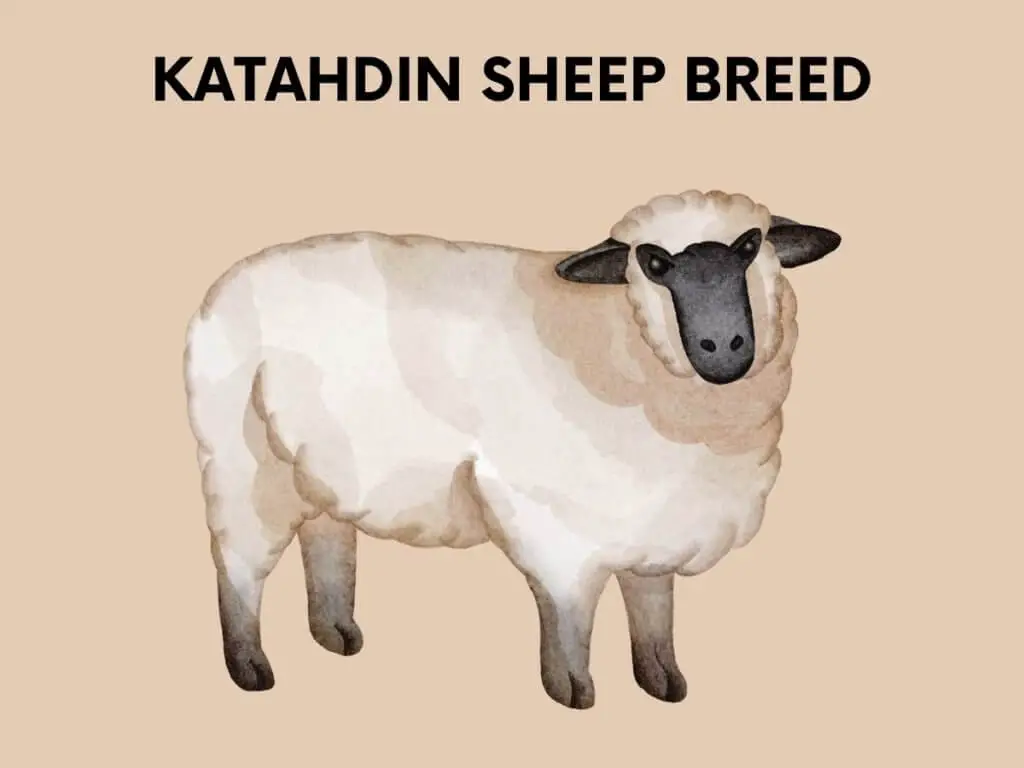
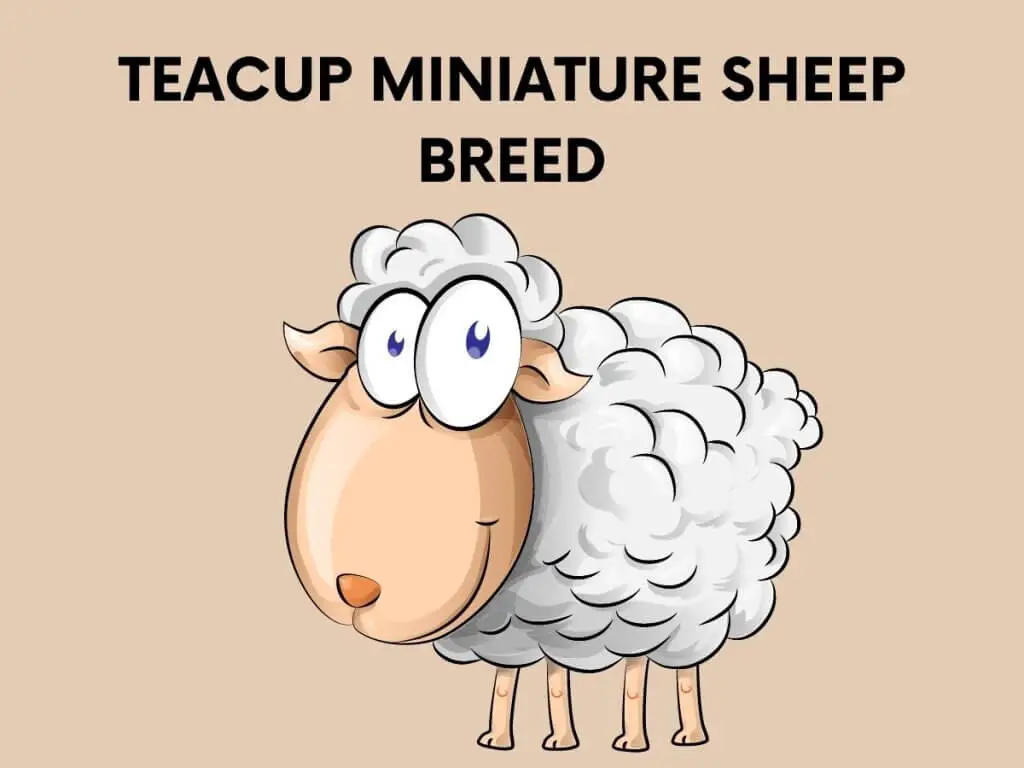

4. Transporting and introducing new animals
Transporting and introducing animals to an existing flock is stressful for the new arrivals and the existing sheep. Quarantine new animals for at least two weeks to ensure they are not carrying any illnesses or diseases that could spread to the rest of the flock.
When introducing the new animals, it’s best to do so gradually, in a separate area, and under close supervision to minimize any aggressive behavior from the existing sheep.
Basic List of Equipment
Raising sheep requires specific equipment to ensure their health and well-being. A basic list of equipment includes:
- fencing materials
- water and feed containers
- shearing equipment
- handling equipment such as a chute and sorting pens
- a trailer for transportation
You should invest in quality equipment to ensure the safety and comfort of the animals.
1. Fencing and gates
Fences and gates are essential for raising sheep domestically as they keep them within their designated grazing areas and protect them from predators.
The height and strength of the fence depend on the breed of sheep and the terrain. Electric barriers also deter predators.
Gates should be wide enough to accommodate the movement of people, equipment, and animals.
2. Water troughs and piping
Water is essential for sheep, so provide easy access to a clean and reliable water source. Water troughs should be large enough to meet the herd’s needs and should be checked regularly for cleanliness and adequate water levels.
You can use piping to transport water to grazing areas or remote locations on the property.
3. Feeding and shearing equipment
Feeding equipment for sheep includes feeders, troughs, and hay racks. Shearing equipment for sheep includes shears, combs, and cutters.
Owning the appropriate equipment for feeding and shearing your sheep ensures their health and comfort.
4. Handling and transportation equipment
Handling and transportation equipment is crucial for managing a sheep flock. Some necessary equipment includes handling chutes, sorting gates, and trailers.
Good equipment reduces stress on the animals and improves the efficiency of handling and transport operations.
Feeding
Feeding is a critical aspect of raising sheep domestically. A balanced diet should meet the nutritional requirements of the flock to maintain their health and productivity.
The diet should include a combination of pasture, hay, and supplemental feed, depending on the season, the availability of forage, and the nutritional needs of the sheep.
1. Understanding sheep nutrition
Sheep have specific nutritional needs, including a careful balance of protein, carbohydrates, and minerals. Understanding the nutritional requirements of sheep allows you to create an appropriate feeding plan, which may include pasture grazing, hay, grain, and supplements.
Consulting with a veterinarian or livestock nutritionist will allow you to design a nutrition plan that meets the specific needs of your sheep.
2. Developing a feeding program
When developing a feeding program for sheep, consider the nutritional requirements of the animals at different life stages, such as growth, gestation, and lactation. The diet should meet the needs of the sheep, including the right amount of energy, protein, minerals, and vitamins.
Feed options include pasture, hay, silage, and commercial feed mixes, and the availability and cost of these should also be considered in developing a feeding program.
3. Evaluating feed quality and availability
When raising sheep domestically, it is crucial to evaluate the quality and availability of their feed. This includes the nutrient content, freshness, and palatability of the feed.
Ensuring a balanced and nutritious diet for your sheep is essential for their health and productivity and also affects the quality of their meat or wool.
4. Monitoring feed intake and weight gain
Monitoring feed intake and weight gain is essential when raising sheep domestically. You can adjust their diet and feeding schedule by tracking how much feed your sheep are consuming and the rate of their weight gain.
This ensures your sheep receive the right nutrition and prevents health issues such as malnutrition or obesity.
Cleaning
Good hygiene helps maintain a healthy living environment for the animals. Keeping a clean environment prevents the spread of disease, reduces stress on the animals, and promotes their overall well-being.
1. Maintaining a clean and hygienic environment
Maintaining a clean and hygienic environment is crucial when raising sheep domestically.
This includes cleaning their living and feeding areas regularly, proper manure disposal, and maintaining clean and fresh water sources.
2. Managing manure and waste
You must ensure the proper disposal of feces, clean their living area regularly, and minimize the environmental impact of waste.
Effective waste management controls the spread of diseases, reduces odors, and improves the quality of the surrounding ecosystem.
3. Implementing biosecurity measures
Stringent biosecurity measures are crucial when rearing sheep as they prevent the spreading of diseases and parasites.
This includes quarantining new animals, limiting visitors, and practicing proper hygiene. Effective biosecurity protects your flock’s health and prevents financial losses due to disease outbreaks.
4. Preventing disease and infection
You must vaccinate and quarantine new animals, conduct regular health checks, and maintain a clean and hygienic environment.
By taking proactive steps to prevent disease, you can ensure the health and productivity of your flock, as well as minimize the risk of disease transmission to other animals or humans.
Health Care
Health care is important as it helps to maintain their well-being and productivity. Booking regular check-ups with a veterinarian, monitoring for signs of illness, and providing appropriate treatment when necessary will keep your flock in tip-top condition.
Proper health care prevents and treats diseases, improves the quality of the meat or wool, and ultimately contributes to the success of your sheep farming operation.
1. Developing a flock health plan
You must identify potential health risks, set preventative measures, and establish protocols for addressing health issues.
By having a comprehensive flock health plan, you can ensure the long-term health and productivity of your flock while also minimizing the risk of disease outbreaks and financial losses.
2. Preventing and treating common diseases
Preventing and treating common diseases is an important aspect of raising sheep domestically. Some common conditions include foot rot, pneumonia, and internal parasites.
Preventative measures include proper nutrition and sanitation, vaccination, and parasite control. In the event of an outbreak, prompt diagnosis and treatment are essential to prevent the spread of disease and minimize the impact on the flock.
3. Maintaining proper vaccination schedules
Vaccines protect against diseases like clostridial diseases and ovine respiratory complex.
Your veterinarian can help you develop a vaccination schedule based on your flock’s needs and risk factors.
Staying up-to-date on vaccinations prevents the spread of disease and ensures the health and productivity of your flock.
4. Working with a veterinarian
Finding the right veterinarian will go a long way to your sheep farm’s success. A veterinarian provides guidance on various topics, including flock health management, disease prevention, and treatment.
They also help you develop a flock health plan, establish vaccination schedules, and provide advice on nutrition and breeding.
Further Aspects And Advice About Raising Sheep
In conclusion, raising sheep can be a rewarding experience for homesteaders and small farm owners alike. Whether you’re raising meat breeds like Katahdin or hair sheep breeds like Dorset, there are many factors to consider, from developing a flock health plan to marketing lamb.
Merino and Rambouillet breeds provide high-quality wool for those interested in wool production, while dairy sheep and dairy goats produce milk for home use.
Careful management practices, such as castration, deworming, and shearing, ensure the health and productivity of your flock, while ewes, ram lambs, and ewe lambs are bred to maintain your flock’s numbers.

